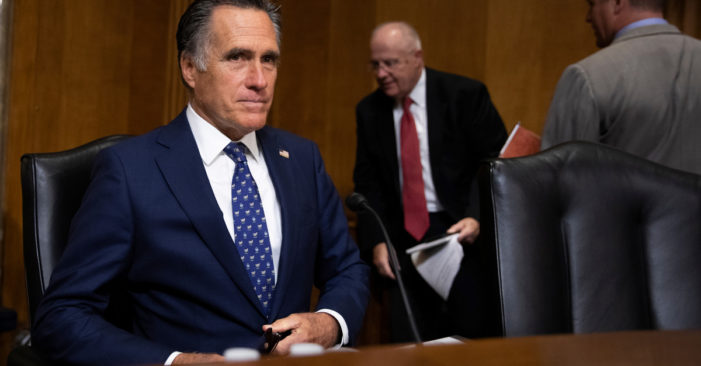Washington DC / USA – October 22 2019: Senator Mitt Romney before a Senate hearing (Shutterstock)
By Dan Balz and Robert Costa, Washington Post
Romney’s decision, announced in a deeply personal speech on the Senate floor, where he spoke of his faith and constitutional duty, sparked an immediate and intense outcry among Trump’s supporters — fury that Romney acknowledged is unlikely to fade.
Donald Trump Jr., the president’s son, called for Romney to be “expelled” from the GOP, while many of Trump’s congressional allies cast him as a bitter and irrelevant relic of a Republican establishment that has all but crumbled before Trump in recent years.
The senator from Utah stood by his decision as Republican criticism mounted Wednesday, maintaining that Trump abused his office by pressuring Ukraine to investigate a political rival.
“I will tell my children and their children that I did my duty to the best of my ability, believing that my country expected it of me,” Romney said in his floor remarks, calling Trump’s conduct “grievously wrong.”
Romney added, “We’re all footnotes at best in the annals of history. But in the most powerful nation on Earth, the nation conceived in liberty and justice, that is distinction enough for any citizen.”
Romney’s vote — coming after other centrist GOP senators such as Lamar Alexander (Tenn.) decided to acquit Trump even as they scolded him for acting inappropriately — was hailed by many Democrats as an example of unflinching political courage from a Republican they have long battled.
Following Romney’s speech, Sen. Brian Schatz (D-Hawaii), walked off the Senate floor in tears and remained speechless for several seconds.
“He literally restored my faith in the institution,” Schatz said.
Presidential historian Jon Meacham said Romney is an “emblem of what so many of us feared was an entirely vanished kind of moderate voice that is guided by reason and not passion. What he did was in the tradition of Dwight Eisenhower, his own father, and George H.W. Bush and Gerald Ford.”
Romney’s father, the late Michigan governor George Romney, was a prominent Republican who was known for being guided by his Mormon faith and a commitment to public service and civil rights. Romney does not speak often of his father, but is inspired by his example far more than he discusses publicly, friends said Wednesday.
“There’s no question that the president asked a foreign power to investigate his political foe,” Romney said in an interview with The Washington Post ahead of his floor statement. “That he did so for a political purpose, and that he pressured Ukraine to get them to help or to lead in this effort. My own view is that there’s not much I can think of that would be a more egregious assault on our Constitution than trying to corrupt an election to maintain power. And that’s what the president did.”
The crux of the case against Trump was the allegation that he withheld military aid and a White House meeting to pressure Ukraine to investigate Joe Biden and his son. Hunter Biden served on the board of Burisma, a Ukrainian energy company, while his father was vice president.
Romney was one of two Republican senators who supported the effort to summon witnesses and documents. He was the only Republican who crossed party lines Wednesday to join Democrats in voting to convict Trump on the first charge, abuse of power, while voting to acquit on the second, obstruction of Congress.
Inside the Senate GOP cloakroom, Romney’s decision was greeted with disappointment but little surprise. Ever since Romney was elected to the Senate in 2018, the 72-year-old senator has parted ways with his party at times and has occasionally criticized Trump — an approach that has won him few allies in a chamber where Trump’s political capital and favor is a prized commodity.
“He’s made it very clear from the beginning, even on the witness vote, that he was going to go his own way,” Sen. John Thune (R-S.D.) said. “This is one of those historical votes where everybody has to do what they think is the right thing.”
Senate Majority Leader Mitch McConnell (R-Ky.) appeared ready to move on from the trial and did not threaten Romney.
“I was surprised and disappointed, but we have much work to do for the American people, and I think Senator Romney has been largely supportive of most everything we’ve tried to accomplish,” McConnell said.
For Romney, breaking with Trump carried not just political consequences in a party he once led as its standard-bearer, but also an issue of family dynamics. Republican National Committee Chairwoman Ronna McDaniel, the daughter of Romney’s older brother, is one of the president’s loyalists — and she firmly stood by Trump on Wednesday.
“This is not the first time I have disagreed with Mitt, and I imagine it will not be the last,” McDaniel tweeted.
The RNC also sent an email to reporters Wednesday taking aim at Romney, under the subject line, “Mitt Romney turns his back on Utah.”
Other Trump allies were far harsher in their response to Romney. “He’s now officially a member of the resistance & should be expelled” from the party, Trump Jr. tweeted.
Romney knew his vote to remove the president from office would bring consequences. Already, there is a bill in the Utah legislature that would allow voters to remove a sitting senator. Last week, the Conservative Political Action Conference disinvited Romney to its annual event. He expects worse in the days ahead.
When Romney was in Florida last weekend, a person at the airport called him a traitor, and someone else later told him to “get with the team,” followed by an epithet.
“It’s going to be there a long, long, long time,” he said in the interview. “And you know, the president’s going to, you know, use me in rallies. I mean, he likes theater, and I can be part of that. So it’s going to be tough.”
Recently appointed Sen. Kelly Loeffler (R-Ga.), facing a tough intraparty primary fight from Rep. Douglas A. Collins, has already used Romney as a foil, attacking him last week for supporting the call for witnesses.
Romney said his decision to vote to convict the president was “the hardest decision” he has ever had to make and one that he hoped he would never have to make. “When [House Speaker] Nancy Pelosi indicated we’re now going to pursue impeachment, my heart sank in dread,” he said.
For a time, he thought — or at least hoped — that Trump’s request to Ukrainian President Volodymyr Zelensky for an investigation into the Bidens during a July 25 phone call represented little more than a throwaway line. As more information came out, Romney came to a different and more worrisome conclusion: that the president had committed a potentially impeachable act.
“He’s the leader of my party,” Romney said of Trump. “He’s the president of the United States. I voted with him 80 percent of the time. I agree with his economic policies and a lot of other policies. And yet he did something which was grievously wrong. And to say, well, you know, because I’m on his team and I agree with him most of the time, that I should then assent to a political motive, would be a real stain on our constitutional democracy.”
Romney said he hoped the president’s defense team would present evidence during the trial that would exonerate the president.
He said he even contacted the White House counsel’s office, through a fellow senator, asking if it would provide affidavits from officials such as former national security adviser John Bolton or acting White House chief of staff Mick Mulvaney, but to no avail.
“I was hoping beyond hope that the defense would present evidence, exculpatory evidence, that would remove from me the responsibility to vote where my conscience was telling me I had to vote,” he said. “And that’s one of the reasons, by the way, that I wanted to hear from Bolton, which is I hoped he would testify and raise reasonable doubt.”
Romney dismissed arguments that a president could be impeached only if there were a statutory crime, calling that “absurd on its face,” and saying he could not think of “a more egregious assault on our constitutional system than corrupting an election and getting a foreign power to do it for you.” What Trump tried to do, he said, is “what autocrats do in tinhorn countries.”
He also dismissed the arguments that the president was justified in asking Ukraine to investigate the Bidens. He said the former vice president might have been guilty of a conflict of interest but added that a conflict of interest is “a matter of judgment, but it’s not a crime.” As for Hunter Biden, he said, “He got a lot of money for his father’s name. That’s unsavory. But again, it’s not a crime.”
Romney acknowledged that Trump threw up “a barrage of efforts” to keep the House from receiving documents or testimony from key administration officials with firsthand knowledge but decided against supporting the obstruction charge. “I don’t think that was an appropriate approach, necessarily,” he said, “but [Trump] did follow the law, and the House did not take the time to go to the courts as I think they should have.”
Some of Romney’s Republican colleagues have suggested the issue should be left to the voters in this year’s election, rather than having the Senate render judgment. Romney said his reading of the Constitution and the Federalist Papers led him to conclude that the Senate must make the decision.
“The Constitution doesn’t say that if the president did something terribly wrong, let the people decide in the next election what should happen,” he said. “It says if the president does something terribly wrong, the Senate shall try him. And so the Constitution is plain.”
Romney said he made his decision knowing that the president would be acquitted by the Senate. “Were mine the deciding vote” to remove Trump from office, he said, “I hope I would have the strength of character to cast that vote. That would be the right thing to do.” He added at another point, “No one wants to vote to remove a president of the United States, and I sure don’t.”
Romney said the question of Trump’s fate now will be decided in the November election. “It’s going to go to the people and they will make the final decision,” he said, adding that he is “highly confident” the president will be reelected given his record and the strength of the economy. And if the Democratic nominee is Sen. Bernie Sanders (I-Vt.) or Sen. Elizabeth Warren (D-Mass.), “he’ll get elected in a landslide,” Romney said.
Yet in a later season of a political life that began at the side of George Romney, Mitt Romney said he kept coming back to questions of duty and faith.
“Again, how do I say before God, ‘I agreed to render impartial justice and let the consequences for me personally outweigh my duty to God and my duty to be to the country that I love?’ ” he said, explaining how he settled on his vote. “That’s simply putting my head down and saying what was done was perfect — there’s nothing to see here. [It] was not something I could do.”

